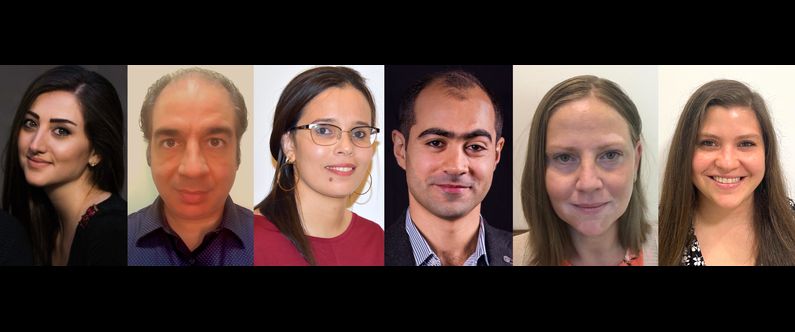Music as medicine: WCM-Q launches online music therapy course
 Presenters of WCM-Q’s new music therapy course, from left to right: Dr. Aseel Massoud, Dr. Waseem Kotoub, Dr. Ghizlane Bendriss of WCM-Q, Taoufik Mirkhan, Zhivka Pesheva, and Rula Barghouthi.
Presenters of WCM-Q’s new music therapy course, from left to right: Dr. Aseel Massoud, Dr. Waseem Kotoub, Dr. Ghizlane Bendriss of WCM-Q, Taoufik Mirkhan, Zhivka Pesheva, and Rula Barghouthi.
An expert team of music therapists, neuroscientists, physicians and musicians has launched an online course at Weill Cornell Medicine-Qatar (WCM-Q) to provide training in the use of music-based interventions to treat a variety of health conditions.
The intensive course, titled Training in Music-Based Interventions: from Fundamentals to Multidisciplinary Implementation, comprises more than 20 live and recorded webinars and provides clinicians and musicians with a set of evidence-based resources describing the main techniques of music-based interventions and their clinical applications.
Music-based approaches are used to treat or manage many different conditions, including speech deficits, neurological diseases such as Parkinson’s and Alzheimer’s, and mental health issues, among many others. Participants who complete the course will learn to differentiate ‘therapeutic music’ or ‘music medicine’ from ‘music therapy’ and to identify the conditions that would benefit from a music therapy intervention. Participants will also explore the latest research studies and clinical trials that use therapeutic music and music therapy for neurological, neuropsychiatric and neurodevelopmental conditions, and will acquire the basic skills required for a multidisciplinary implementation of music-based interventions. The course is believed to be the first program of its kind to be tailored to the needs of Middle Eastern populations and includes a history of music-based therapies in the region, and the therapeutic use of traditional Middle Eastern instruments, sounds and music.
The course material is presented by neuroscientist Dr. Ghizlane Bendriss, assistant professor of biology at WCM-Q; medical doctor, music therapist and professional lyrical soprano singer Dr. Aseel Massoud; music therapist Rula Barghouthi; medical doctor, concert pianist and composer Dr. Waseem Kotoub; qanun teacher and head of the Arab Music Department at Qatar Music Academy Taoufik Mirkhan, ney teacher Ibrahim Kadar; and pianist Zhivka Pesheva, a senior piano faculty member at Qatar Music Academy.
During the course, participants will learn about the current status of music therapy in Qatar, and discuss how healthcare professionals, musicians and music therapists can work together to implement effective music-based interventions in the country and raise awareness of the benefits of these approaches.
Dr. Bendriss said: “With the development of neuroscience, our understanding of what music can do to the brain is improving. Current data and evidence are supporting the use of music and music tools in therapy for many neurological conditions and diseases. With the help of new technologies such as functional MRI and PET scans, we have learnt that simply listening to music can decrease the levels of cortisol, and increase the release of opioids, dopamine and serotonin from various parts of the brain. The most important advantage of active music therapy is that it stimulates neuroplasticity, thereby stimulating the formation of new connections between different parts of the brain, allowing people to improve their speech, their movements and retrieve spatial and temporal orientation or improved attention. Because music is not a drug that has the same composition and dosage for each patient, we are witnessing the development of precision music medicine, where the environmental and cultural background of the patients is taken into consideration and a plan tailored to their individual needs is produced.”
Dr. Thurayya Arayssi, professor of clinical medicine and vice dean for academic and curricular affairs, said: “There is clear and compelling evidence that music-based interventions can be extremely effective and useful for many patients with a range of health issues. This excellent course will provide musicians and physicians with the skills and knowledge needed to determine who can benefit from music-based interventions and how to implement them most effectively.”
The course is accredited locally by the Ministry of Public Health’s Department of Healthcare Professions – Accreditation Section and internationally by the Accreditation Council for Continuing Medical Education (ACCME).
For more information about the course, click here: https://qatar-weill.cornell.edu/continuing-professional-development/cpd-events/upcoming-events